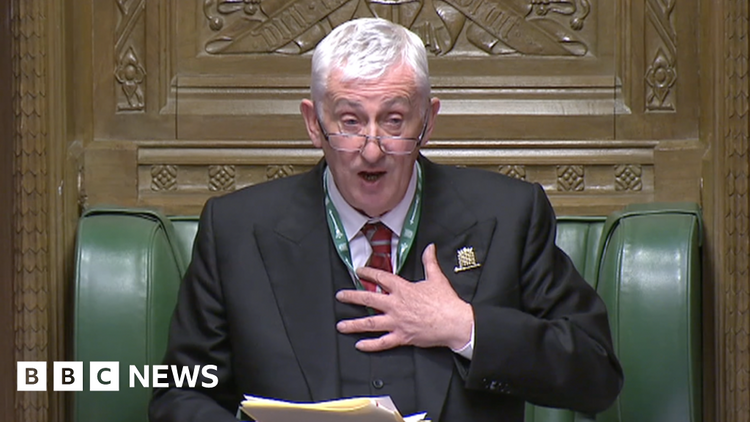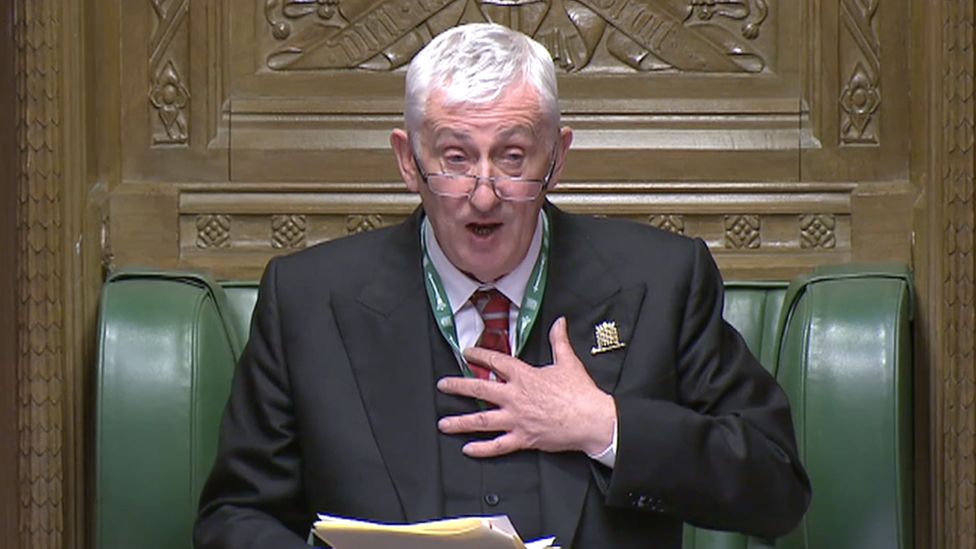Sir Lindsay Hoyle: House of Commons Speaker under pressure after chaotic Gaza ceasefire vote

The featured photograph in this blog post was obtained from the UK Parliament's image source.
After apologizing to MPs, Sir Lindsay came back to the chamber.

Rewritten: Authored by Ali Abbas Ahmadi The blog section features articles and posts written by Ali Abbas Ahmadi.
The Speaker of the House of Commons is facing more and more pressure following a discussion about a truce in Gaza that turned into a state of confusion.
Sir Lindsay Hoyle caused a lot of anger among members of the SNP and Conservative parties by going against tradition and permitting a vote on the Labour party's proposal for an "urgent humanitarian truce".
Sir Lindsay has apologized after the incident, however he is still being urged to step down from his position.
Around 33 Members of Parliament (MPs) from the Conservative and Scottish National Party (SNP) have signed a statement indicating that they do not believe in the Speaker's ability to lead.
Sir Lindsay expressed his regrets to the House of Commons following the vote and stated that he is accountable for his conduct. He will soon hold a meeting with significant members from leading political parties to discuss the matter, but the exact date of the meeting is yet to be determined.
On Wednesday, a disagreement happened in the House of Commons which coincided with the SNP's opposition day. This allowed the Scottish nationalists to suggest topics for discussion and decision-making.
Initially, the SNP proposed a resolution to establish an "instantaneous cessation of hostilities" in Gaza. Typically, this proposal would have required Members of Parliament to discuss and vote on it before addressing any revisions that have been put forth by other political groups.
Nevertheless, Sir Lindsay departed from the usual practice and permitted a Labour alteration for the SNP proposal to take precedence, which evoked anger from both the SNP and the Conservatives.
The Speaker announced that he had made this choice to allow Members of Parliament to voice their opinions on "the broadest possible array of proposals."
The Labour party introduced a modification that urged for a prompt ceasefire focused on humanitarian efforts. The change acknowledged that Israel would not halt hostilities if Hamas persisted with aggressive actions. The modification also proposed initiating diplomatic measures to achieve the formation of a secure Israel state coexisting with a workable Palestinian state.
The SNP proposed a motion that was more extensive, urging for a halt in hostilities and the cessation of penalizing all Palestinians.
The government's suggestion was not as comprehensive as the one proposed by Labour, and it requested an "immediate cessation of hostilities for humanitarian purposes."
Sir Lindsay was accused of allowing Labour to take over the vote when he decided to have them vote first.
The choice made by Sir Lindsay resulted in Sir Keir Starmer not having to deal with another possible mutiny among the members of the Labour party concerning their stance on Gaza. This also meant that Labour MPs who backed the idea of a ceasefire in the conflict were able to demonstrate their support without having to vote in favor of the SNP's proposal.
In November of last year, Sir Keir faced a significant uprising when 56 of his Members of Parliament, which included 10 of his frontbenchers, disobeyed him by supporting an SNP proposal that called for an immediate end to hostilities.
Emotions intensify during the discussion on Gaza in the House of Commons involving the Speaker.
The amendment proposed by Labour was accepted amid loud approval without any official voting process. This happened because the government had declared they would not participate in any resistance.
As a result, the topic of discussion shifted away from the SNP's motion, as there was no chance for a vote on it.
The government is not obligated to conform to what the Labour party suggests since the vote does not carry any mandatory weight.
MPs from the SNP and a few Tories were observed leaving the parliamentary chamber due to their concerns about the Speaker's management of the voting process.
Penny Mordaunt, who is in charge of the Commons, expressed that Sir Lindsay's decision had caused a lack of trust among Members of Parliament. She also mentioned that this allowed for the Labour party to take over the discussion in an undesired manner.
She mentioned that this had caused a lot of tension among the members of this House on a topic that has already sparked intense emotions.
Afterward, Sir Lindsay came back to clarify his conclusion and express remorse.
Amidst the loud cries of "step down", he stated: "I believed that what I did was the correct and most beneficial action, but I feel remorse for it and I express my apologies for how it unfolded."
"I hold myself accountable for my actions, which is why I wish to have a meeting with the individuals who have had significant involvement."
The leader of SNP in Westminster, Stephen Flynn, recognized the Speaker's apology but mentioned that Commons officials had cautioned that the resolution might result in his party being unable to vote on a day designated for SNP opposition.
He was openly angry and expressed that his political group had been shown disrespect and disregard.
He stated that he needs strong persuasion to believe that your current situation is not unbearable.
Following the debate, Mr. Flynn expressed his disappointment by saying that Sir Keir Starmer and the Speaker collaborated in preventing Parliament from voting on the SNP motion, which he found disgraceful.
He further commented that the UK Parliament had an opportunity to make the right decision by voting for a prompt ceasefire between Gaza and Israel. Unfortunately, instead of using this opportunity appropriately, the Parliament transformed into a chaotic and confusing situation, like a circus in Westminster.
Afterwards, he informed the PA news agency: "I believe we might require a small analysis of the events that have occurred in this situation."
According to an insider who is familiar with the Speaker, the claim that he was coerced by the Labour Party is completely false.
According to an insider, Sir Lindsay made this decision after much consideration. They also noted that Sir Lindsay held a strong awareness of the significant amount of stress that MPs, their loved ones, and staff members were undergoing, and took great care in keeping their safety in mind.
After the allegations of "collusion" were made, Sir Keir denounced the actions of both the Conservatives and SNP, saying they prioritized political maneuvering instead of focusing on tangible resolutions.
When speaking to BBC News, John Healy, the opposition's Defence Secretary, dismissed the accusations of cooperation as nonsense.
The Speaker was fulfilling his duty by safeguarding the entitlements of every Member of Parliament. It was his aim to promote a comprehensive discussion and to guarantee that the central proposals from the foremost political parties such as Labour, the Conservatives, and the SNP were given the opportunity to be voted on.
Take a glance: Commotion in Parliament regarding the approval of ceasefire in Gaza.
Many members of parliament have requested that the Speaker resign, and a total of 33 Tories and SNP MPs have made known their lack of trust in him by signing a motion early on.
Although only a small number of early day motions are discussed, they provide Members of Parliament the opportunity to express their endorsement of a specific matter - in this instance, disagreement towards the actions of Sir Lindsay.
Pete Wishart, an MP from the SNP, added his signature to the proposal. He mentioned that he did it because the Speaker's position seems almost impossible to maintain.
Nonetheless, numerous MPs stated that they would not undertake this action.
Ex-Conservative leader Robert Buckland affirmed that he acknowledges the expression of remorse from the Speaker and won't push for a confidence vote.
The disorderly situation in the British Parliament took attention away from the discussion about whether there should be a cessation of hostilities in Gaza, while countless supporters of Palestine congregated in Parliament Square.
Tobias Ellwood, a member of the Conservative Party, expressed his disappointment at the happenings in Parliament. According to him, the debate was supposed to be a chance for them to emphasize their recommended course of action and how to resolve the issue. However, both sides resorted to political maneuvering during the discussion.
Many people waited in a long line to speak to Members of Parliament about the vote on a ceasefire in Gaza.
Sir Lindsay, who was initially selected as a Labour MP, abandoned his party affiliation after being appointed as Speaker, which is customary.
At the beginning of this week, the Labour party changed their stance by urging for a humanitarian ceasefire to take place without delay. This decision came after several months of being convinced by both party members and supporters.
After Hamas attacked southern Israel on October 7th, resulting in the deaths of approximately 1,200 individuals and the capture of over 240 more, Israel initiated their actions in Gaza.
Israel's military operation in Gaza has resulted in the deaths of over 29,000 individuals, as reported by the Palestinian territory's health ministry, which is managed by Hamas. The United Nations acknowledges these statistics.





























































